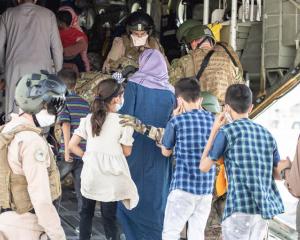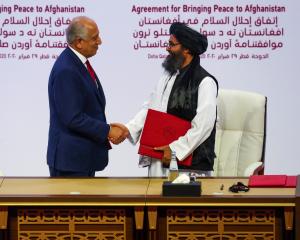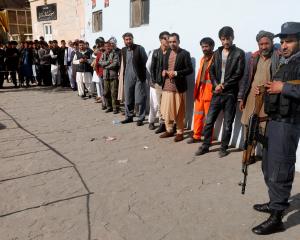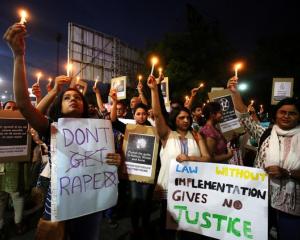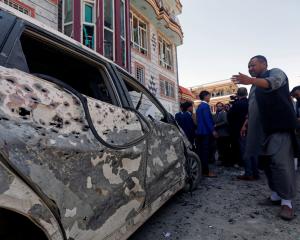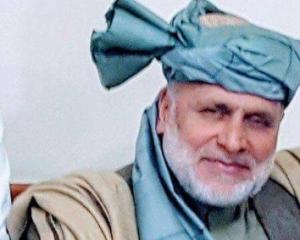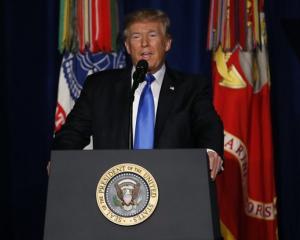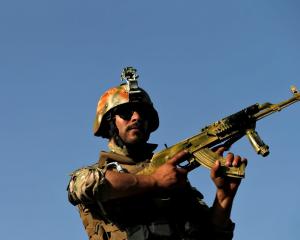Nothing about recently announced Afghan peace talks points to an easy or a quick resolution, despite each party involved in the process putting on a brave face.
As soon as the plans for discourse between the Taliban and American and Afghan officials were announced, United States Secretary of State John Kerry needed to speak to Afghan President Hamid Karzai to try to defuse tensions over the opening of a new Taliban office in Qatar.
Mr Karzai later appeared willing to continue security talks with the US, which he had suspended in protest over the office. Officials speaking for Mr Karzai said the president objected to a Taliban flag flying from the building, and also the name put on the building - the Islamic Emirate of Afghanistan.
As the ongoing Middle East peace talks continue to show, getting any agreement between avowed enemies is a slow and tortuous process. Any slight, imagined or real, can burst into a major international issue in the blink of an eye.
The Taliban is said to have signalled a breakthrough in efforts to start Afghan peace negotiations. If the talks begin, they will be a significant step in peace efforts that have been locked in an impasse for nearly 18 months after the Taliban walked out and accused the US of negotiating in bad faith.
American officials have long pushed for such talks, believing them crucial to stabilising Afghanistan after the 2014 Western military withdrawal.
The Taliban's language makes it clear that it seeks to be dealt with as a legitimate political force with a long-term role to play beyond the insurgency.
A former US State Department official says that by agreeing to negotiations, the Taliban can come out in the open, engage the rest of the region as a legitimate actor, and it will be very difficult to prevent that when the US recognises the office and is talking to the office.
The Taliban office in Qatar opened on the same day that Nato handed over security for the whole of Afghanistan to the Afghan Government for the first time since the Taliban was ousted in 2001.
Less than 12 hours later, the US confirmed that four US personnel died at Bagram air base near Kabul, in what is thought to be a mortar attack. The Taliban claimed responsibility.
How the US and the Taliban can start to talk about peace, when these incidents continue to happen, will be a challenge.
The White House has demanded, and the Taliban accepted, two preconditions for the talks: that the Taliban makes a statement supporting a peace process, and that it opposes the use of Afghan soil to threaten other countries.
The US has agreed that a formal rejection of al Qaeda by the Taliban leadership will now be a negotiating aim, rather than a precondition for talks.
It will also seek a commitment from the Taliban to end its insurgency in Afghanistan and recognise women's rights in the country.
For many in the world, the recognition of women's rights will be a touchstone policy, although it is difficult to believe much will change in a country which treats women as second-class citizens.
Roadblocks to peace are already emerging. Despite the deal being partly brokered by Pakistan and the emir of Qatar - after months of diplomatic work also involving Germany, Norway and the United Kingdom - it will take a political resolve of enormous proportions to make even the slowest of progress.
Mr Karzai would prefer the talks to take place in Afghanistan and was initially lukewarm about the Qatar plans, despite visiting the state twice this year.
But ongoing attacks on US troops will sour some Americans on any talks with the Taliban, and Mr Karzai can play both sides to achieve his goals.
Western officials believe the Taliban has grown weary of international isolation and wants to shed its outcast status.
To that end, the group's announcement to return to negotiations has come at little cost. It does not need to make realistic proposals or strike an actual deal. The Taliban just needs to be seen at the table, even without real offers of peace.

